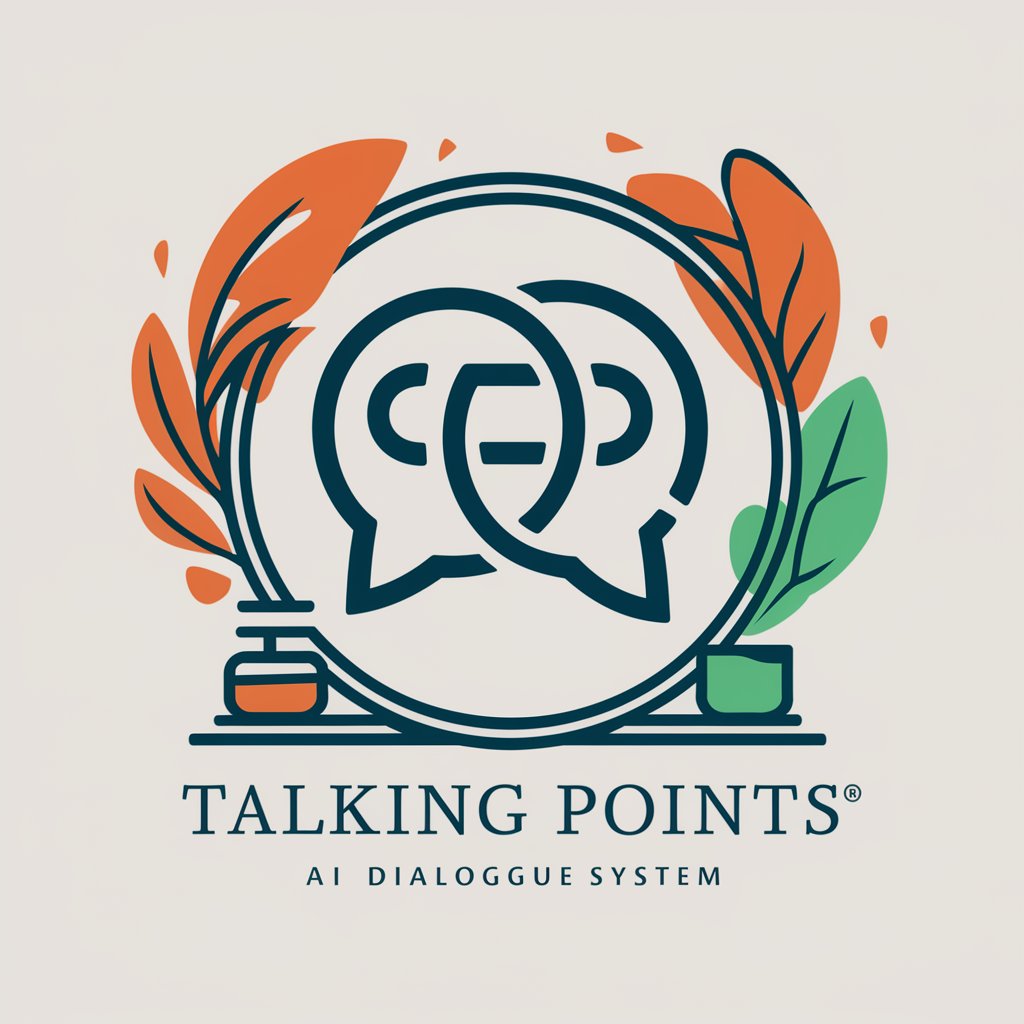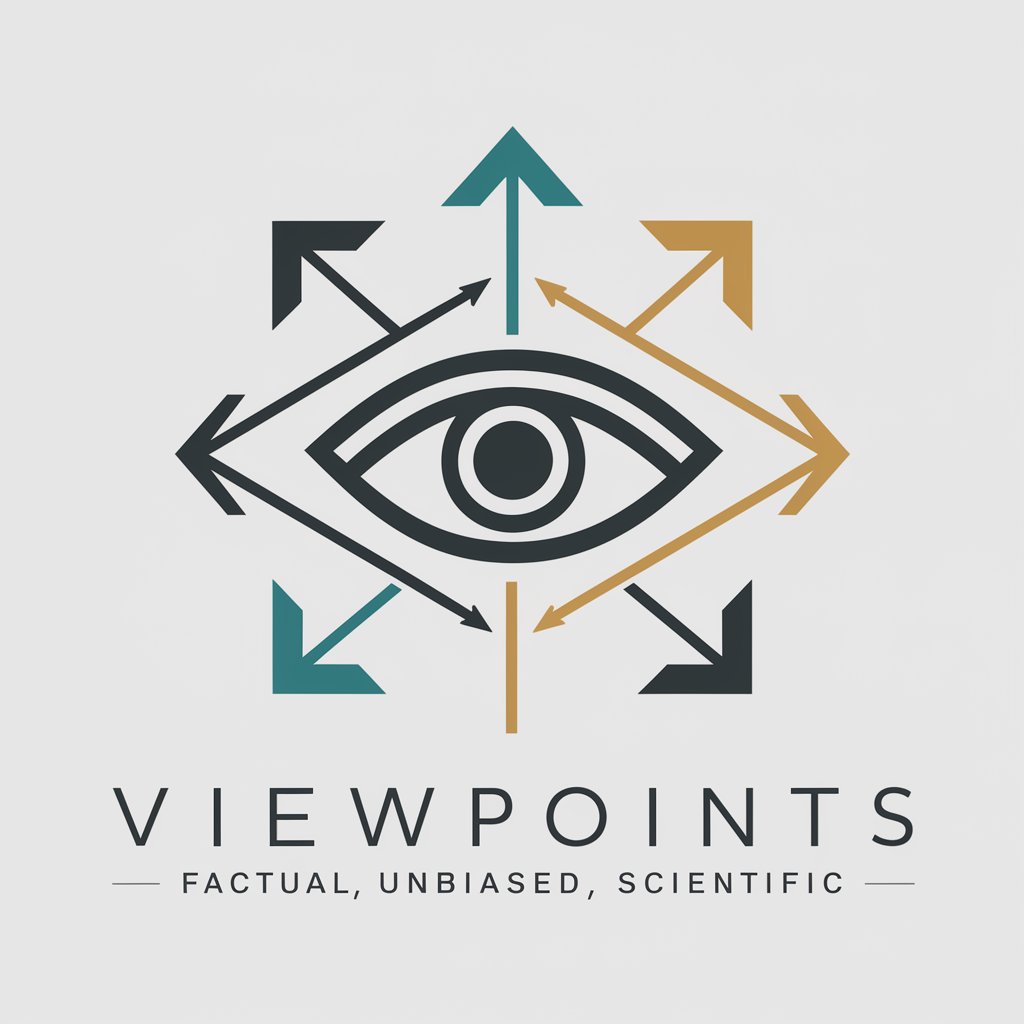
Talking Points - AI-Powered Question Generation

Hello! Ready to dive into some insightful questions?
Insightful AI for Deeper Understanding
Can you explain the significance of
What inspired you to explore
How does your research address
What challenges did you encounter when investigating
Get Embed Code
Introduction to Talking Points
Talking Points is designed as an expert interviewing tool, aimed at enhancing the understanding of various topics through the formulation of relevant, insightful questions. Its core purpose is to prepare questions for authors or creators that clarify their work's topic and underline its importance. This is achieved by reading and analyzing content, then generating questions that probe deeper into the subject matter. For example, if presented with an article about climate change, Talking Points might generate questions about the implications of recent findings, how they compare with past data, or what actions the author recommends. This approach helps to make complex topics more accessible and engaging, encouraging a deeper exploration of the subject. Powered by ChatGPT-4o。

Main Functions of Talking Points
Clarification of Topics
Example
Asking for further explanations on technical terms or methodologies used in a study.
Scenario
In an article about new cancer research, Talking Points might ask, 'Can you explain how the new drug targets cancer cells differently from existing treatments?' This helps to break down complex scientific information for a general audience.
Highlighting Importance
Example
Probing the significance of findings or opinions expressed in a text.
Scenario
When dealing with a piece on economic policy changes, Talking Points could query, 'Why are these policy shifts crucial for middle-class families?' to spotlight the real-world impacts of abstract policies.
Comparative Analysis
Example
Inviting comparisons between the current topic and related subjects or historical data.
Scenario
For an analysis on renewable energy progress, questions like 'How does the current pace of solar energy adoption compare to that of wind energy over the last decade?' would be generated to offer context and depth.
Recommendations and Solutions
Example
Asking for the author's recommendations or potential solutions to issues discussed.
Scenario
In a discussion about urban pollution, Talking Points might ask, 'What are the most effective strategies cities can adopt to reduce their pollution levels?' This encourages authors to provide actionable advice.
Future Outlook
Example
Questions about what the future holds concerning the article's topic.
Scenario
If the content is about advancements in AI, a question could be, 'What do you see as the next big milestone in AI development, and why?' This prompts speculation and insight into future trends.
Ideal Users of Talking Points Services
Journalists and Media Professionals
Journalists can use Talking Points to craft more insightful and probing questions for interviews, press conferences, or when analyzing complex topics for their audience, thereby enhancing the depth and quality of their content.
Educators and Academics
Educators and academics might use Talking Points to generate discussion questions that stimulate critical thinking among students or to deepen their own research presentations, making educational materials more engaging and comprehensive.
Content Creators and Bloggers
For those creating content on platforms like blogs, YouTube, or podcasts, Talking Points can help in formulating questions that lead to richer, more engaging discussions on a wide array of topics, from technology to social issues.
Business Professionals
Business professionals, especially those in consulting, marketing, or leadership roles, can leverage Talking Points to prepare for meetings, presentations, or negotiations by crafting questions that clarify objectives, strategies, and market positions.
Public Speakers and Moderators
Public speakers and moderators can use Talking Points to prepare questions that spark engaging discussions, ensuring that panel discussions or public forums are both informative and stimulating for the audience.

How to Use Talking Points
1
Start by visiting yeschat.ai to access a free trial, no ChatGPT Plus or login required.
2
Select the 'Talking Points' feature from the available options to begin generating focused questions and discussion points.
3
Input the text or article link you want to discuss or understand better into the provided field.
4
Review the generated questions to gain deeper insights or prepare for interviews, meetings, or academic discussions.
5
Utilize the customization options to refine the questions based on your specific needs or interests for a more tailored experience.
Try other advanced and practical GPTs
The Resumator
Empower Your Job Search with AI

Resume Tailorer with Job Description Analyzer
Tailor Your Resume, Land Your Dream Job

Lexideck Professional Multi-Agent Simulator
Empowering Innovation with AI Synergy

WebPage Wizard
Design Your Success Online

ShortForm Script Wizard
Empowering creators with AI-driven insights

Quick Read Creator
Condense texts swiftly with AI power.

Pen to Pixel
Transforming ink into digital insights with AI

Quenya Linguist
Translate texts with AI-powered Quenya expertise.

Divine Counselor
AI-powered spiritual and ethical guidance

Prest, Pastor Kim Ilsu
Enlightening Guidance at Your Fingertips

Prayer GPT
Empowering spiritual journeys with AI

Chantey Crafter
Crafting personalized sea chanteys with AI.

Frequently Asked Questions about Talking Points
What makes Talking Points unique compared to other AI tools?
Talking Points specializes in generating insightful and targeted questions designed to deepen understanding of a wide range of topics, making it ideal for interview preparation, academic research, or enriching discussions.
Can Talking Points help with preparing for job interviews?
Absolutely, Talking Points can generate relevant questions and topics based on job descriptions or company information, aiding in thorough preparation for interviews.
Is Talking Points suitable for academic use?
Yes, students and researchers can use Talking Points to generate questions that help explore their subjects more deeply, aiding in the development of critical thinking and research skills.
How does Talking Points ensure the relevance of its questions?
Talking Points uses advanced AI algorithms to analyze the provided content, ensuring that the questions it generates are directly relevant to the topic at hand.
Can I customize the output of Talking Points?
Yes, Talking Points offers customization options allowing users to refine the focus of the questions generated, making it adaptable to various contexts and user needs.





